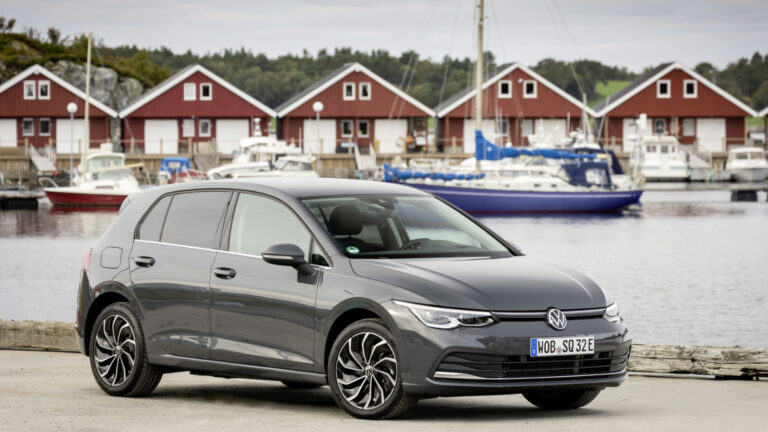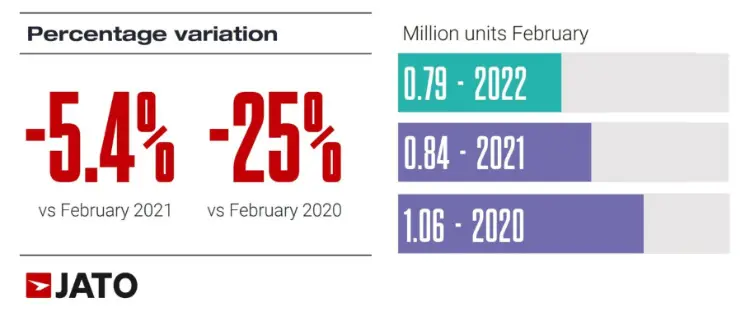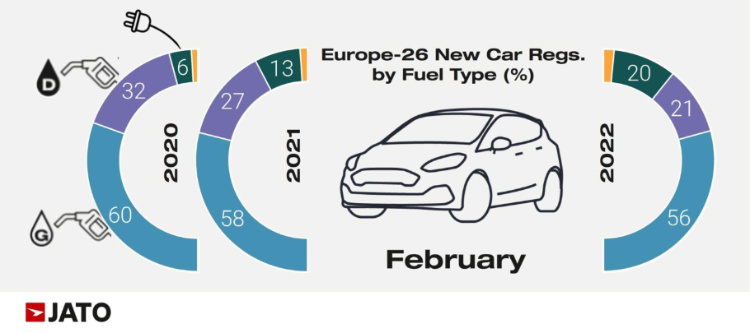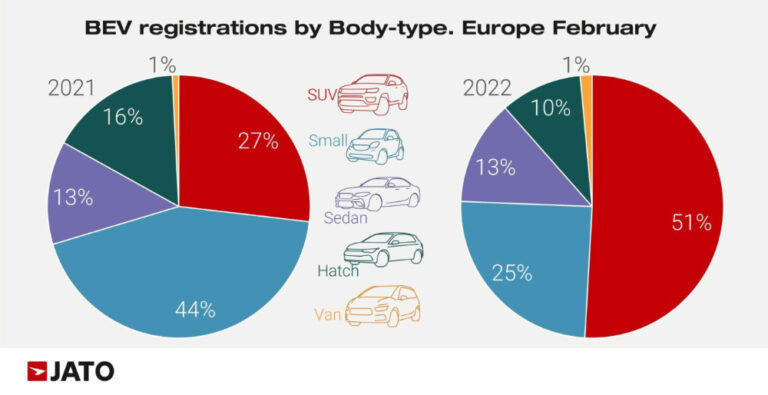In February 2022, the European new car market was 5.4% weaker but sales of electric cars and SUVs increased to new record market share highs in Europe.

New passenger vehicle registrations in Europe contracted by another 5.4% in February 2022 to a four-decade low of just less than 800,000 cars — a quarter down on February 2020. Electric car sales (BEV and PHEV) took a fifth of the European new car market, equal to sales of diesel cars. Tesla was the top-selling electric car brand ahead of Kia, Hyundai, and Volkswagen. More than half of all new cars sold in Europe in 2022 were SUVs. The Volkswagen Golf was the top-selling car model in Europe in February 2022.
Latest European Car Market Statistics 2022: By Country, Brands, Models, Electric, January, February, March, April, May, June, July, August, September, October, November, Full Year, 2021 & 2020
European New Car Market in February 2022

Data gathered by JATO Dynamics across 26 European markets, new vehicle registrations fell by 5.4% in February 2022 to 794,576 units. Sales in February 2022 were a quarter down on the total achieved in February 2020. The year-to-date 2022 volume decreased by 3.8% to 1,607,321 units.
Felipe Munoz, Global Analyst at JATO Dynamics, commented: “Last month’s results marked the lowest volume recorded in February for four decades. The market has historically been defined by high volumes and low margins but we’re beginning to see this shift the other way around.”
The European new car market continued to struggle in February. The geopolitical situation in Ukraine impacted the semiconductor shortage further while also affecting other aspects of the supply chain. As a consequence, many OEMs were forced to halt production, delaying the delivery of new vehicles. However, the war only impacted the final days of the month with a more severe supply shortage threatening European car production and deliveries likely in March and beyond.
Car Sales in Europe by Fuel Type in February 2022

In February 2022, battery electric vehicles (BEV) represented 56% of all demand for low emissions vehicles (BEV, PHEV, Hydrogen). Volume increased by 77% compared with February 2021 to a total of 87,400 units. In contrast, the volume of plug-in hybrids (PHEV) increased by just 6% to 67,400 units.
The emergence of new models and the ongoing support of incentives has had a clear impact on consumer demand for BEVs. SUVs continued to be a key driver of growth accounting for 49% of total demand across all segments. Munoz continued: “Without the arrival of competitive electric SUVs, the BEV segment looked set to remain a niche market in Europe. But thanks to OEM investment in these vehicles, demand continues to grow which is helping to offset the challenges currently faced by the industry.”
Best-Selling Electric Car Brands in Europe
Tesla led the BEV market in Europe in February 2022 with an 18.1% market share, ahead of the Volkswagen Group which secured 17.6% across all brands. The Volkswagen brand was outsold by Hyundai and Kia which took second and third position respectively in the ranking by brand.
Tesla’s results are explained by the continued popularity of the Model 3, the top-selling BEV in February, in addition to the success of the Model Y which secured second position in the BEV ranking by model. The Model 3 was the most popular BEV in Spain, France, and Germany, while the Model Y led in Austria, Belgium, Switzerland, Denmark, and the UK. Munoz added: “Tesla’s February results suggest that we could well see new monthly records for the brand in March.”
Tesla’s position in Europe, and especially a more steady supply of vehicles, should be strengthened in the rest of 2022 by the opening of the new Tesla factory outside Berlin at the end of March 2022.
Car Sales in Europe by Market Segment in February 2022

SUVs accounted for 51% of all BEV registrations in February 2022 in Europe. However, these vehicles accounted for only 11% of total SUV registrations, indicating that there remains significant potential for electrified SUVs to grow within the segment.
SUVs are vaguely defined in Europe with any car termed an SUV by its manufacturer generally classed as one. It makes little sense to count for example a Renault Captur and a Mercedes-Benz GLS as the same body type while distinguishing between small, sedan, and hatchback cars.
Top Ten Best-Selling Car Models in Europe in February 2022

The Volkswagen Golf was again the most popular car in Europe in February 2022. However, year to date 2022, the VW Golf was narrowly outsold by both the Peugeot 208 and the Dacia Sandero. Within the top 10, only the Peugeot 3008 and Hyundai Tucson registered growth in February.
The Toyota Yaris Cross, Tesla Model 3, Mini Hatch, Opel/Vauxhall Mokka, Hyundai Kona, Kia Sportage, Tesla Model Y, and Citroen C4 also posted strong results. Among the latest launches, the Renault Arkana was the third best-selling Renault; the Hyundai IONIQ 5 outsold the Volkswagen ID.4 and Skoda Enyaq. Volkswagen registered more than 3,000 units of the Taigo while Kia registered more than 2,000 units of the EV6.
Europe Car Sales Statistics for 2022
→ Latest European Car Sales Statistics
- Full-Year 2022: Car Sales by Country, Brands, Models, Electric
- Car Sales and Market Analysis: January, February, March, April, May, June, July, August, September, October, November, Full Year
- Electric Car Sales: Q1, Full Year by Country
Car Sales Statistics for Europe in 2021
→ Latest European Car Sales Statistics
- Car Sales and Market Analysis: January, February, March, April, May, June, July, August, September, October, November, December, Full Year 2021
- Top-Selling Car Models: Top 25 Models 2021, Top 15 Electric Models
- Sales per European Country: Q1, Half Year, Q3, Full Year
- Sales by Brand: Q1, Half Year, Q3, Full Year
- Electric and PHEV Sales by Country: Q1, Half Year, Q3, Full Year, Top Electric Brands and Models
